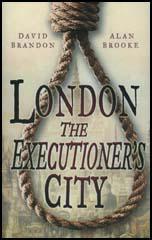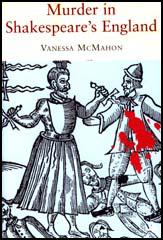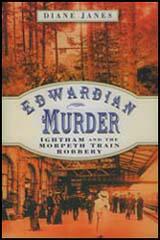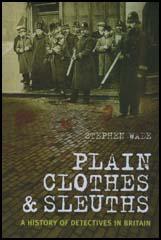Spartacus Review
Volume 1: 1st October, 2007
Crime and Punishment

Title: London: The Executioner's City
Author: David Brandon & Alan Brooke
Editor:
Publisher: Sutton
Price: £9.99
Bookshop: Amazon
Spartacus Website: Cato Street Conspiracy
Category:
Tyburn Fields is the best known site of execution in London, but London may be aptly named the executioner's city, so many were the places where executions could and did occur. "London - The Executioner's City" reveals the capital as a place where the bodies of criminals defined the boundaries of the city and heads on poles greeted patrons on London Bridge. The ubiquity of crime and punishment was taken for granted by countless generations of the capital's inhabitants, though it seems to have done little to stem the tide of criminality that has always threatened to engulf the city. The book is a powerful evocation of the dark side of London's history, where the great and not so good, the poor and helpless, the cruel and the idealistic crowd together to be punished in public. A King and more than one Queen, heretics, archbishops, pirates, poisoners, plotters, murderers and a cook executed for selling putrid fish met death by hanging, beheading, burning or boiling in London, and on most occasions the crowd roared its approval. David Brandon and Alan Brooke's book is a vivid picture of capital punishment in a capital that seems to have thrived on executions.

Title: Murder in Shakespeare's England
Author: Vanessa McMahon
Editor:
Publisher: Continuum
Price: £14.99
Bookshop: Amazon
Spartacus Website: The Tudors
Category:
Fascination with murder is not a modern phenomenon. People in the past were just as interested in extreme violence and homicide as people nowadays. In seventeenth-century England all excessive and gratuitous violence was condemned and prosecuted, with murderers being categorized as particularly wicked. The courtrooms where murderers were tried were packed and crowds attended their execution. Ballads about notorious cases and prints reflected the huge interest such cases generated. Yet, in a world with no police and little forensic expertise, identification, pursuit and prosecution presented many difficulties. "Murder in Shakespeare's England" looks at a series of murder cases, ranging from brawls to infanticide, and including serial and sex killings, to paint a picture of how murder was committed, discovered and punished in Stuart England.

Title: Edwardian Murder
Author: Diane Janes
Editor:
Publisher: Sutton
Price: £14.99
Bookshop: Amazon
Spartacus Website: John Dickman
Category:
Caroline Luard was shot near Ightham in Kent in 1908. Within weeks, her husband, the respectable Major-General Charles Luard, committed suicide. It was rumoured that he killed himself following a tip-off from the local chief constable that he was about to be arrested. In 1910, John Nisbet, a colliery cashier, was robbed and murdered on a train in Northumberland. Three days after the crime, police arrested a man called John Dickman, who was subsequently executed. The conviction, however, relied on circumstantial evidence. In 1950, C. H. Norman, who acted as official shorthand writer at Dickman's trial, claimed that Dickman was framed for Nisbet's murder, because the judge and prosecuting council believed him guilty of the murder of Caroline Luard. Is it conceivable that John Dickman was guilty of both murders? Or was he framed, and unjustly executed? This new book provides the definitive account of both murders. Including previously unpublished evidence, it is a compelling read, vividly recreating the atmosphere of the Edwardian age. These true crimes bear all the hallmarks of traditional English period murder: steam trains, revolvers, an isolated summerhouse, retired army officers, parlour maids, to say nothing of conspiracy theories, murder, suicide, an execution and a love story.

Title: Plain Clothes & Sleuths
Author: Stephen Wade
Editor:
Publisher: Tempus
Price: £16.99
Bookshop: Amazon
Spartacus Website: Famous Crimes
Category:
The detective is a familiar figure in British history, from the Victorian truncheon-bearing bobby to the undercover sleuth of the twenty-first century. But there is much in the history of our investigative police force that remains in the dark. Using detective training manuals, Home Office enquiries, Parliamentary papers and unpublished memoirs of retired detectives, Stephen Wade looks at famous cases such as the Ripper murders and the beginnings of the Special Branch and Detective Branch of Scotland Yard. His fascinating history covers aspects of crime history that have not yet been written about, including the career of Jim 'the Penman' Saward, a notorious forger, the detectives who were corrupted during the hunt for him and the infamous Trial of the Detectives of 1876 - a massive corruption trial involving six Scotland Yard detectives. It was this that led to the creation of a professional Scotland Yard as we know it today. Appealing to criminologists, social and crime historians and, most significantly, readers of crime fiction and true crime, this new history is a vital part of our crime heritage.
